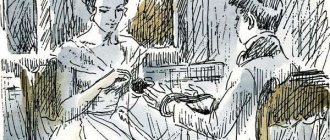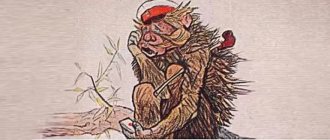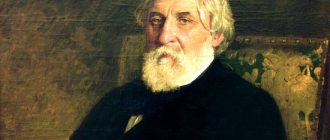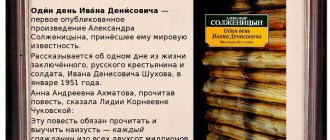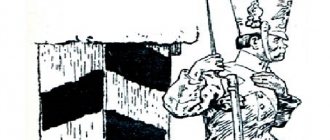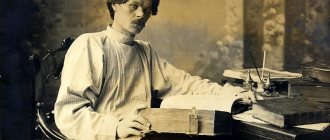The sad detective read online for free
Leonid Soshnin returned home in the worst mood.
And although it was a long walk, almost to the outskirts of the city, to the railway village, he did not get on the bus - even if his wounded leg ached, but walking would calm him down and he would think about everything that was told to him at the publishing house, he would think about and decide how he should continue to live and what to do. Actually, there was no publishing house as such in the city of Veisk; a branch of it remained; the publishing house itself was transferred to a larger city, and, as the liquidators probably thought, more cultural, with a powerful printing base. But the “base” was exactly the same as in Veisk - a decrepit legacy of old Russian cities. The printing house was located in a pre-revolutionary building made of strong brown brick, stitched with bars of narrow windows at the bottom and shaped curved windows at the top, also narrow, but already raised upward like an exclamation mark. Half of the building of the Wei printing house, where there were typesetting shops and printing machines, had long since sunk into the bowels of the earth, and although there were fluorescent lamps in continuous rows along the ceiling, it was still uncomfortable in the typesetting and printing shops, it was chilly and somehow all the time, as if in clogged ears, there was a squealing or working, buried in a dungeon, a delayed-action explosive mechanism.
The publishing department huddled in two and a half rooms, creakingly allocated by the regional newspaper. In one of them, shrouded in cigarette smoke, a local cultural luminary, Oktyabrina Perfilyevna Syrovasova, twitched, squirmed on a chair, grabbed the phone, littered with ashes, moving local literature forward and further. Syrokvasova considered herself the most knowledgeable person: if not in the whole country, then in Veisk she had no equal in intelligence. She made presentations and reports on current literature, shared plans for the publishing house through the newspaper, sometimes in newspapers, and reviewed books by local authors, inappropriately and inappropriately inserting quotes from Virgil and Dante, from Savonarola, Spinoza, Rabelais, Hegel and Exupery , Kant and Ehrenburg, Yuri Olesha, Tregub and Ermilov, however, she sometimes disturbed the ashes of Einstein and Lunacharsky, and did not ignore the leaders of the world proletariat.
Everything has long been decided with Soshnin’s book. The stories from it were published, albeit in thin, but metropolitan magazines, they were condescendingly mentioned three times in review critical articles, he stood “in the back of his head” for five years, got into the plan, established himself in it, all that remained was to edit and design the book.
Having set the time for a business meeting at exactly ten, Syrokvasova arrived at the publishing house at twelve. Having smelled Soshnin of tobacco, out of breath, she rushed past him along the dark corridor - someone had “stole” the light bulbs, and hoarsely said “Sorry!” and crunched the key in the faulty lock for a long time, swearing in a low voice.
Finally, the door squawked angrily, and the old, tightly closed tile let a crack of gray, dull light into the corridor - it had been light rain for the second week on the street, washing away the snow into mush, turning the streets and alleys into coils. Ice drift began on the river - in December!
His leg ached dully and continuously, his shoulder burned and dulled from a recent wound, he was overcome by fatigue, he was drawn to sleep - he couldn’t sleep at night, and again he saved himself with pen and paper. “This incurable disease is graphomania,” Soshnin grinned and seemed to doze off, but then the silence was shaken by a knock on the echoing wall.
- Galya! — Syrokvasova threw arrogantly into space. - Call this genius to me!
Galya is a typist, accountant and also a secretary. Soshnin looked around: there was no one else in the corridor, so he was the genius.
- Hey! Where are you here? - Opening the door with her foot, Galya stuck her short-cropped head out into the corridor. - Go. Name:
Soshnin shrugged his shoulders, straightened the new satin tie around his neck, and smoothed his hair to one side with his palm. In moments of excitement, he always stroked his hair - as a little boy, his neighbors and Aunt Lina stroked him a lot, so he learned to stroke himself. - "Calmly! Calmly!" - Soshnin ordered himself and, coughing politely, asked:
- Can I come to you? “With the trained eye of a former operative, he immediately took in everything in Syrokvasova’s office: an antique chiseled bookcase in the corner; put on a turned wooden peak, a wet red fur coat, familiar to everyone in the city, hung humpbacked. The fur coat did not have a hanger. Behind the fur coat, on a planed but unpainted shelf, the literary products of the united publishing house are displayed. In the foreground were several very well designed advertising and gift books in leather bindings.
“Take off your clothes,” Sirokvasova nodded at the old yellow wardrobe made of thick wood. — There are no hangers, nails are driven in. “Sit down,” she pointed to the chair opposite her. And when Soshnin took off his cloak, Oktyabrina Perfilyevna irritably threw the folder in front of her, taking it out almost from under the hem.
Soshnin barely recognized the folder with his manuscript - it had gone through a difficult creative path since he handed it over to the publishing house. With the gaze of the former operative, he noted that a kettle had been placed on it, and a cat was sitting on it; someone had spilled tea on the folder. If it's tea? Syrokvasova's prodigies - she has three sons from different creative producers - drew a dove of peace, a tank with a star and an airplane on the folder. I remember that he deliberately selected and saved the colorful daddy for his first collection of stories, made a little white sticker in the middle, and carefully wrote out the title, although not very original, with a felt-tip pen: “Life is more precious than anything else.” At that time, he had every reason to assert this, and he carried a folder to the publishing house with a feeling of still unknown renewal in his heart, and a thirst to live, to create, to be useful to people - this happens with all people who have been resurrected, who have climbed out of “out there.”
The little white sticker turned gray in five years, someone picked at it with a fingernail, maybe the glue was bad, but the festive mood and lightness in the heart - where is all this? He saw on the table a carelessly stored manuscript with two reviews, written on the fly by the lively local drunken thinkers who worked part-time for Syrokvasova and saw the police, which was reflected in his work in this motley folder, most often in the sobering-up station. Soshnin knew how dearly human negligence costs every life, every society. Well, I got it. Firmly. Forever.
“Well, that means life is the most precious thing,” Syrokvasova pursed her lips and took a drag from her cigarette, became enveloped in smoke, quickly flipping through the reviews, repeating and repeating in thoughtful detachment: “More expensive than anything... more expensive than everything...
Essay on the topic: “Sad detective”
Composition. “Sad Detective” V.P. Astafiev is a writer whose works reflect the life of people of the 20th century. Astafiev is a person who knows and is close to all the problems of our sometimes difficult life. Viktor Petrovich went through the war as a private and knows all the hardships of post-war life. I think that with his wisdom and experience he is one of those people whose advice and orders you should not only listen to, but try to follow. But Astafiev does not act as a prophet, he simply writes about what is close to him and what worries him. Although the works of Viktor Petrovich belong to modern Russian literature, the problems that are often raised in them are more than one thousand years old. Eternal questions of good and evil, punishment and justice have long forced people to look for answers to them. But this turned out to be a very difficult matter, because the answers lie in the person himself, and good and evil, honesty and dishonor are intertwined in us. Having a soul, we are often indifferent. We all have a heart, but we are often called heartless. Astafiev’s novel “The Sad Detective” raises the problems of crime, punishment and the triumph of justice. The theme of the novel is the current intelligentsia and the current people. The work tells about the life of two small towns: Veisk and Khailovsk, about the people living in them, about modern morals. When people talk about small towns, the image of a quiet, peaceful place appears in the mind, where life, filled with joys, flows slowly, without any special incidents. A feeling of peace appears in the soul. But those who think so are mistaken. In fact, life in Veisk and Khailovsk flows in a stormy stream. Young people, drunk to the point where a person turns into an animal, rape a woman old enough to be their mother, and the parents leave the child locked in the apartment for a week. All these pictures described by Astafiev terrify the reader. It becomes scary and creepy at the thought that the concepts of honesty, decency and love are disappearing. The description of these cases in the form of summaries is, in my opinion, an important artistic feature. Hearing every day about various incidents, we sometimes don’t pay attention, but collected in the novel, they force us to take off our rose-colored glasses and understand: if it didn’t happen to you, it doesn’t mean that it doesn’t concern you. The novel makes you think about your actions, look back and see what you have done over the years. After reading, you ask yourself the question: “What good and good have I done? Did I notice when the person next to me felt bad? “You begin to think that indifference is as evil as cruelty. I think that finding answers to these questions is the purpose of the work. In the novel “The Sad Detective” Astafiev created a whole system of images. The author introduces the reader to each hero of the work, talking about his life. The main character is police operative Leonid Soshnin. He, a forty-year-old man who was wounded several times in the line of duty, should retire. Having retired, he begins to write, trying to figure out where there is so much anger and cruelty in a person. Where does he keep it? Why, along with this cruelty, does the Russian people have pity for the prisoners and indifference to themselves, to their neighbor - a disabled person of war and labor? Astafiev contrasts the main character, an honest and brave operative worker, with policeman Fyodor Lebed, who quietly serves, moving from one position to another. On especially dangerous trips, he tries not to risk his life and gives the right to neutralize armed criminals to his partners, and it is not very important that his partner does not have a service weapon, because he is a recent graduate of a police school, and Fedor has a service weapon. A striking image in the novel is Aunt Granya - a woman who, without children of her own, gave all her love to the children who played near her house at the railway station, and then to the children in the Children's Home. Often the heroes of a work, who should cause disgust, cause pity. Urna, who has transformed from a self-employed woman into a drunkard without a home or family, evokes sympathy. She screams songs and pesters passers-by, but she becomes ashamed not for her, but for the society that has turned its back on the Urn. Soshnin says that they tried to help her, but nothing worked, and now they simply don’t pay attention to her. The city of Veisk has its own Dobchinsky and Bobchinsky. Astafiev does not even change the names of these people and characterizes them with a quote from Gogol’s “The Inspector General,” thereby refuting the well-known saying that nothing lasts forever under the sun. Everything flows, everything changes, but such people remain, exchanging clothes of the 19th century for a fashionable suit and shirt with gold cufflinks of the 20th century. The city of Veisk also has its own literary luminary, who, sitting in his office, “enveloped in cigarette smoke, twitched, squirmed in his chair and littered with ashes.” This is Oktyabrina Perfilyevna Syrovasova. It is this man, whose description brings a smile, that moves local literature forward and further. This woman decides what works to print. But not everything is so bad, because if there is evil, then there is also good. Leonid Soshnin makes peace with his wife, and she returns to him again along with her daughter. It’s a little sad that the death of Soshnin’s neighbor, Tutyshikha’s grandmother, forces them to make peace. It is grief that brings Leonid and Lera closer together. The blank sheet of paper in front of Soshnin, who usually writes at night, is a symbol of the beginning of a new stage in the life of the protagonist’s family. And I want to believe that their future life will be happy and joyful, and they will cope with grief, because they will be together. The novel "The Sad Detective" is an exciting work. Although it is difficult to read, because Astafiev describes too terrible pictures. But such works need to be read, because they make you think about the meaning of life, so that it does not pass colorlessly and empty. I liked the piece. I learned a lot of important things and understood a lot. I met a new writer and I know for sure that this is not the last work by Astafiev that I will read. . "The Sad Detective"
novstudent.ru | 09/15/2012
Viktor Petrovich Astafiev and his novel “The Sad Detective”. 10th–11th grades
Sections: Literature
Lesson objectives: to give a brief overview of the writer’s life and work; reveal the problems posed in the novel; to interest students in the work of V.P. Astafiev; develop the ability to conduct a discussion.
Lesson equipment: portrait and exhibition of the writer’s books, photographs.
Preliminary task: preparation of individual tasks (message, expressive reading of passages).
Teacher's opening speech
The work of any writer cannot be considered separately from his biography, because without life’s difficulties, without experience, without sorrows and joys, no artist grows. The environment in which a person was born and lived undoubtedly leaves an imprint on his character, worldview, and, for a creative person, on his works. Viktor Petrovich Astafiev is one of the brightest representatives of Russian literature of the second half of the 20th century, whose writing activity constantly came into contact with his fate.
Viktor Petrovich Astafiev was born in Siberia, in the village of Ovsyanka, Krasnoyarsk Territory, on the night of May 2, 1924. He lost his mother early (she drowned in the Yenisei), and was raised in the family of his grandparents, then in an orphanage. He ran away from there, wandered, went hungry... The boy found himself an orphan with a living father, who, after the death of his wife, soon started another family and did not care about his son. The years of Astafiev's childhood and adolescence were similar to the destinies of his peers. The books that the teenager read avidly saved his soul. The writer will talk about this in the stories “Theft” and “The Last Bow”.
Shortly before the Great Patriotic War, he would graduate from the FZO school, work at a railway station, and in the fall of 1942 he would go to the front. Wounded three times, shell-shocked, he will still survive and start a family. He will tell about the difficult post-war years in the story “The Cheerful Soldier”. During these difficult years, V.P. Astafiev and his family lived in the Urals - it was easier to find work there.
He wrote his first story while on duty at night at a sausage factory. The story about the fate of signalman Moti Savintsev was praised and published in the Chusovskoy Rabochiy newspaper. This happened in 1951. And from that moment on, V.P. Astafiev devoted his entire life to writing, about which he will say this: “Writing is a constant search, complex, exhausting, sometimes leading to despair. Only mediocrity, accustomed to using “secondary raw materials,” lives an easy and comfortable life. I am the author of short stories, novels, among which there are some that have received recognition from readers, translated into many languages, every time I approach a new thing with fear, then I “accelerate, enter” into it until I finish - I don’t know any peace.”
This attitude towards one’s work indicates high responsibility.
Viktor Astafiev's prose developed in the classical traditions of Russian literature by L.N. Tolstoy and F.M. Dostoevsky. Philosophical understanding of life, the role of man on earth, love for the motherland and home, good and evil in relation to the world, especially to its defenseless representatives - children, women, old people, animals, nature, the role of family - these are not all moral questions , which Viktor Astafiev solves in his works.
The poet N. Novikov has the following poems:
You can never return anything, Just like you can’t etch out spots in the sun, And, having set out on the way back, Still won’t come back. This truth is very simple, And it, like death, is immutable. You can return to the same places, But it is impossible to go back...
Yes, it is impossible to return thoughtlessly destroyed nature - the home of man. She will repay with devastation of the soul. Viktor Astafiev is well aware of this and wants to warn about the impending disaster. This desire is the writer’s pain, his melancholy and bitter anxiety. Listen to an excerpt from the final chapter “There is no answer for me” of the novel “The King Fish”.
“Mana! I looked for the red comb of the Mansky bull. No! The hydrobuilders brushed it off. And the beautiful river itself is bristling with hummocks of rafted timber. A bridge has been built across Manu. When they drilled soil for supports at the mouth of the river, wood was found in the samples at a depth of eighteen meters. Drowned and buried forest, more and more larch - it almost does not rot in water. Maybe our descendants will also thank us for at least the wood reserves made for them in such a cunning way? Goodbye Mana! And forgive us! We tortured not only nature, but also ourselves, and not always out of stupidity, more out of need... My native Siberia has changed. Everything flows, everything changes - hoary wisdom testifies. It was. That's it. It will be so. There is an hour for everything and a time for every task under heaven; A time to be born and a time to die; There is a time to plant and a time to pluck out what is planted; A time to kill and a time to heal; A time to destroy and a time to build; A time to cry and a time to laugh; A time to scatter stones and a time to gather stones; A time to be silent and a time to speak. So what am I looking for? Why am I suffering? Why? For what? There is no answer for me.”
Each time gives rise to its own questions that we must answer. And today we must torment ourselves with these questions and answer them in order to preserve our lives. This is also discussed in the novel “The Sad Detective”.
“The Sad Detective” was published in the 1st issue of “October” magazine for 1986. The atmosphere of those years was the beginning of perestroika. The authorities have taken a course towards transparency in all spheres of public life. In many works there was an appeal to the material of modern life and an activity unprecedented in the literature of previous years, even sharpness in expressing the author’s position. Unsightly pictures of modern life and the spiritual impoverishment of man were revealed to the reader. Such material also determined the genre of the “Sad Detective” - a variant of a journalistic accusatory diary. It was in the journalism of the 80s of the 20th century that the signs of a new literary and social situation clearly manifested themselves. Is it possible to consider it a coincidence that the style of Astafiev’s novel “The Sad Detective” echoes the writing principles of the writers of the sixties of the 19th century, who proclaimed their goal and purpose of literature to be the education in a person of freedom, responsibility and consciousness. That is why the novel “The Sad Detective” requires thoughtful reading and deep understanding.
Analytical conversation
- Try to convey the emotional perception of this work. What feelings did you have?
(Feeling of heaviness, depression due to a string of senselessly cruel acts, due to the fact that human dignity is violated).
- How do you understand the title of the novel, why is it a sad detective story? What is the reason for the author’s sadness?
(With the fact that the lives of people dear to him are being destroyed, villages are dying, that life in the city and in the countryside is limited and closed. It’s sad because the foundations on which human kindness has eternally rested are collapsing).
- In many of Astafiev’s works, do the characters express his aesthetic ideal and moral position? Are there such heroes in the novel “The Sad Detective”?
(Yes, first of all, this is Leonid Soshnin, a former police detective. His sad story about his own misadventures and the troubles of the environment confirms the capacious significance of the title of the novel. Leonid Soshnin is a caring, honest, principled, selfless person. He resists evil out of conscience, and not out of service.
Students also celebrate such heroes as Aunt Granya, Aunt Lina, Markel Tikhonovich, Pasha Silakova. Giving examples from the text, they conclude that these heroes are the ideal of a person for Astafiev, and note that Aunt Granya is the ideal of kindness and compassion. How many children did she replace their mother with, instilling a love of work, honesty, and kindness. But she herself lived very modestly, without income. And she didn’t have children of her own, but only kindness was born from her kindness. When cruel people offended Aunt Granya, and she forgave them, Leonid Soshnin was tormented by the pain of the injustice of what had been done. Every time he wanted to run after Aunt Granya and shout at the whole people so that she would forgive him “and all of us”).
- In our difficult times, there are also many orphans and orphanages. Are those people who help orphanages and take in children doing the right thing? Can only wealthy people do this?
Other characters
Lerka is Leonid’s wife, an unimportant housewife, demanding of her husband, a superficial woman.
Svetka is the daughter of Leonid and Svetka.
Lina and Granya are Leonid’s aunts, who raised him after his mother’s death.
Fyodor Lebeda is Soshnin’s partner, operative.
Venka Fomin is a criminal, a drunkard, from whom the inhabitants of a small village suffered.
Tutyshikha , a neighbor’s old lady, who died, prescribed a bottle of Riga Balsam.
Summary
Chapter 1
Forty-two-year-old Leonid Soshnin, a former criminal investigation operative, “returned home in the worst mood.” His book, entitled “Life Is Worth More Than Everything,” was finally cleared for publication after a long wait. However, the joy of this news was spoiled by an unpleasant conversation with an arrogant editor. On the way home, he was tormented by heavy thoughts, the main one of which was “How can a single person live in the world?”
After two wounds, Soshnin was forced to leave his police service and retire on disability. His wife Lera left him after another quarrel, taking her little daughter Svetka with her.
Chapter 2
Leonid slowly walked home, remembering his life. After the death of his mother, he remained to live with his aunt Lina, who was soon convicted and sent to a colony. No less beloved was Aunt Granya, who worked with children all her life.
Once, when Soshnin was already working in the police, Aunt Granya was “raped for something” by four guys who had drunk themselves into unconsciousness. A strict and fair judge sentenced “all four voluptuaries to eight years of strict regime.” But the most amazing thing was that Aunt Granya felt sorry for the criminals and believed that she had ruined their young lives.
Chapter 3
Already at the entrance to Soshnin, a tipsy group arrived. The man tried to settle the conflict peacefully, but the guys, inflamed by wine fumes, longed for a different outcome. One of them demanded that Soshnin apologize to them “properly: clearly, abruptly, intelligibly.” However, the former policeman was not going to endure humiliation from the local punks, and, despite old injuries, he deftly defeated three hooligans. Then Soshnin called the police and reported the fight.
Chapter 4
The hero remembered how once, together with his partner, he chased a drunkard on a motorcycle who stole a truck. As it turned out later, the hijacker arrived in their town from the Far North with an impressive amount of money. He “got drunk with joy, he wanted heroic deeds, and he stole a dump truck,” crippling human lives along the way. All police forces were sent to catch him, and public transport came to the rescue. They pinned the hijacker as best they could, hoping that he would crash into some kind of fence. No one dared to “shoot at the criminal - there were people all around,” they only shouted over a megaphone, warning people of the danger.
We managed to drive the truck onto a country road, but it turned out to be no easier - there were four funeral processions near the cemetery and a large construction site. “It’s scary to think what the hijacker could have done here,” and Soshnin ordered his partner Fyodor Lebeda to shoot him. Before his death, the thief managed to push the motorcycle, and Soshnin was seriously injured - his leg was supported “by one skin and a vein.” Amputation was avoided, but the man remained lame for the rest of his life.
Chapter 5
Leonid was overwhelmed with memories of how he met his wife. Twenty-two-year-old Lerka, a pharmacy student, was a big fashionista, and wore "tight, skinny jeans and a puffy Garibaldi headscarf." One day, hooligans attacked her and began to pull off her ill-fated jeans right behind the kiosk. Soshnov “beat off the young lady” and soon married her.
As long as there was mutual passion, the young people lived well. Then “the child, everyone’s favorite and only one, Svetka, united the family for some time.” But soon mutual reproaches ate away the already fragile family from within, and the couple fled.
Chapter 6
Soshnin also remembered the incident that put an end to his career as a policeman. One day Leonid brought his daughter to his wife’s parents, who lived in a small village. He learned that local residents were being terrorized with impunity by a completely drunken criminal, Venka Fomin. He tormented lonely, defenseless old women, took away the pennies they had hidden for funerals, and with this money he “feasted and went wild with his friends.”
During Venka’s arrest, Fomin “snatched a pitchfork with a broken handle from the hay” and, with all his strength, thrust it into Soshnin, who unfortunately slipped and fell. The wounded policeman barely had time to be taken to the hospital, where he was saved from certain death. The second disability group put an end to Soshnin’s further career, and he retired.
Chapter 7
Soshnin recalled completely wild cases from his practice and analyzed the fates of his acquaintances. He sadly stated the fact that “life is diverse, and you can live in it in a variety of ways.”
Out of sadness, Soshnin called his wife, with whom relations began to gradually improve for the better. Lerka suggested that he take first-grader Svetka for the weekend - “to disperse the merchlyundia.” Lerka herself was in a hurry to go on a date with her neighbor, a bulldozer driver, who “makes four hundred a month.”
Chapter 8
Soshnin witnessed the great joy of the neighbor's girl Yulka, to whom her parents from Riga brought fashionable new clothes: a velvet suit, a snow-white turtleneck, shoes, a wig. Leonid involuntarily winced - “they bought off their own child again.”
Yulka lived with her grandmother while her parents went to work. Yulka ran to her friends in the dorm to show off her new clothes. Grandma Tutyshikha offered Soshnin expensive “Riga Balsam”, which she already drank to celebrate. Leonid politely refused, “went up to his room—it was almost two in the morning.”
Chapter 9
Leonid woke up from Yulka’s heart-rending scream. He hurried to the neighbors, and found a frightened girl over the body of her grandmother - Tutyshikha, joyfully drinking the entire bottle of Riga Balsam, went to another world.
At the magnificent funeral of Tutyshikha, Soshnin met Lerka and her daughter, who stayed overnight with him. Svetka whistled softly in her sleep with her cold nose, “timidly clinging to it, Lerka slept.” For the first time in a long time, Leonid felt peaceful and happy. He realized “that he needs to somehow improve his life, understand it.”
Sad detective, in short. Summary.
All works in abbreviation by this author The Shepherd and the Shepherdess The Sad DetectiveForty-two-year-old Leonid Soshnin, a former criminal investigation operative, returns home from a local publishing house to an empty apartment, in the worst mood. The manuscript of his first book, “Life is More Precious than Everything,” after five years of waiting, has finally been accepted for production, but this news does not make Soshnin happy. A conversation with the editor, Oktyabrina Perfilyevna Syrovasova, who tried to humiliate the author-policeman who dared to call himself a writer with arrogant remarks, stirred up Soshnin’s already gloomy thoughts and experiences. “How to live in the world? Lonely? - he thinks on the way home, and his thoughts are heavy.
He served his time in the police: after two wounds, Soshnin was sent to a disability pension. After another quarrel, Lerka’s wife leaves him, taking with her his little daughter Svetka.
Soshnin remembers his whole life. He cannot answer his own question: why is there so much room in life for grief and suffering, but always close to love and happiness? Soshnin understands that, among other incomprehensible things and phenomena, he has to comprehend the so-called Russian soul and he needs to start with the people closest to him, with the episodes he witnessed, with the destinies of the people his life encountered... Why are Russian people ready to take pity on the bone crusher and bloodletter and not notice how a helpless war invalid is dying nearby, in the next apartment?.. Why does a criminal live so freely and cheerfully among such kind-hearted people?..
In order to distract himself from his gloomy thoughts at least for a minute, Leonid imagines how he will come home, cook himself a bachelor’s dinner, read, sleep a little so that he has enough strength for the whole night - sitting at the table, over a blank sheet of paper. Soshnin especially loves this night time, when he lives in some kind of isolated world created by his imagination.
Leonid Soshnin's apartment is located on the outskirts of Veysk, in an old two-story house where he grew up. From this house my father went to war, from which he did not return, and here, towards the end of the war, my mother also died from a severe cold. Leonid stayed with his mother's sister, Aunt Lipa, whom he had become accustomed to calling Lina since childhood. Aunt Lina, after the death of her sister, went to work in the commercial department of the Wei Railway. This department was “judged and replanted at once.” My aunt tried to poison herself, but she was saved and after the trial she was sent to a colony. By this time, Lenya was already studying at the regional special school of the Internal Affairs Directorate, from where he was almost kicked out because of his convicted aunt. But the neighbors, and mainly Lavrya’s father’s fellow Cossack soldier, interceded for Leonid with the regional police authorities, and everything turned out okay.
Aunt Lina was released under an amnesty. Soshnin had already worked as a district police officer in the remote Khailovsky district, from where he brought his wife. Before her death, Aunt Lina managed to nurse Leonid’s daughter, Sveta, whom she considered her granddaughter. After Lina's death, Soshniny passed under the protection of another, no less reliable aunt named Granya, a switchwoman on the shunting hill. Aunt Granya spent her whole life taking care of other people’s children, and even little Lenya Soshnin learned the first skills of brotherhood and hard work in a kind of kindergarten.
Once, after returning from Khailovsk, Soshnin was on duty with a police squad at a mass celebration on the occasion of Railway Worker's Day. Four guys who were drunk to the point of losing their memory raped Aunt Granya, and if it weren’t for his patrol partner, Soshnin would have shot these drunken fellows sleeping on the lawn. They were convicted, and after this incident, Aunt Granya began to avoid people. One day she expressed to Soshnin the terrible thought that by convicting the criminals, they had thereby ruined young lives. Soshnin shouted at the old woman for feeling sorry for non-humans, and they began to avoid each other...
In the dirty and spit-stained entrance of the house, three drunks accost Soshnin, demanding to say hello and then to apologize for their disrespectful behavior. He agrees, trying to cool their ardor with peaceful remarks, but the main one, a young bully, does not calm down. Fueled by alcohol, the guys attack Soshnin. He, having gathered his strength - his wounds and hospital "rest" took their toll - defeats the hooligans. One of them hits his head on the heating radiator when he falls. Soshnin picks up a knife on the floor, staggers into the apartment. And he immediately calls the police and reports the fight: “One hero’s head was split on a radiator. If so, don’t look for it. The villain is me."
Coming to his senses after what happened, Soshnin again remembers his life.
He and his partner were chasing a drunk on a motorcycle who had stolen a truck. The truck rushed like a deadly ram through the streets of the town, having already ended more than one life. Soshnin, the senior patrol officer, decided to shoot the criminal. His partner fired, but before he died, the truck driver managed to hit the motorcycle of the pursuing policemen. On the operating table, Soshnina’s leg was miraculously saved from amputation. But he remained lame; it took him a long time to learn to walk. During his recovery, the investigator tormented him for a long time and persistently with an investigation: was the use of weapons legal?
Leonid also remembers how he met his future wife, saving her from hooligans who were trying to take off the girl’s jeans right behind the Soyuzpechat kiosk. At first, life between him and Lerka went in peace and harmony, but gradually mutual reproaches began. His wife especially did not like his literary studies. “What a Leo Tolstoy with a seven-shooter pistol, with rusty handcuffs in his belt!..” she said.
Soshnin recalls how one “took” a stray guest performer, a repeat offender, Demon, in a hotel in the town.
And finally, he remembers how Venka Fomin, who was drunk and returned from prison, put a final end to his career as an operative... Soshnin brought his daughter to his wife’s parents in a distant village and was about to return to the city when his father-in-law told him that a drunk man had locked him up in a neighboring village in the barn of old women and threatens to set them on fire if they do not give him ten rubles for a hangover. During the detention, when Soshnin slipped on manure and fell, the frightened Venka Fomin stuck a pitchfork into him... Soshnin was barely taken to the hospital - and he barely escaped certain death. But the second group of disability and retirement could not be avoided.
At night, Leonid is awakened from sleep by the terrible scream of the neighbor girl Yulka. He hurries to the apartment on the first floor, where Yulka lives with her grandmother Tutyshikha. Having drunk a bottle of Riga balsam from the gifts brought by Yulka’s father and stepmother from the Baltic sanatorium, Grandma Tutyshikha is already fast asleep.
At the funeral of grandmother Tutyshikha, Soshnin meets his wife and daughter. At the wake they sit next to each other.
Lerka and Sveta stay with Soshnin, at night he hears his daughter sniffling behind the partition, and feels his wife sleeping next to him, timidly clinging to him. He gets up, approaches his daughter, adjusts her pillow, presses his cheek to her head and loses himself in some kind of sweet grief, in a resurrecting, life-giving sadness. Leonid goes to the kitchen, reads “Proverbs of the Russian People” collected by Dahl - the section “Husband and Wife” - and is amazed at the wisdom contained in simple words.
“Dawn was already rolling in like a damp snowball through the kitchen window, when, having enjoyed the peace among the quietly sleeping family, with a feeling of long-unknown confidence in his capabilities and strength, without irritation or melancholy in his heart, Soshnin stuck to the table and placed a blank sheet of paper in the spot of light and froze over him for a long time.”
All Russian works in abbreviated alphabetical order:
— — — — — — — — — — — — — — — — — — — — — — — — — —
Writers for whom there are works in abbreviation:
- Abramov F. A.
- Adamovich A.
- Aitmatov Ch. T.
- Aksakov S. T.
- Aksenov V. P.
- Aleshkovsky Yu.
- Andreev L. N.
- Arbuzov A. N.
- Artsybashev M. P.
- Astafiev V. P.
- Akhmatova A. A.
- Babel I. E.
- Baklanov G. Ya.
- Balter B.I.
- Baratynsky E. A.
- Belov V.I.
- Bely A.
- Belykh G. G.
- Belyaev A. R.
- Bestuzhev A. A.
- Bitov A.G.
- Blok A. A.
- Boborykin P. D.
- Bogomolov V. O.
- Bondarev Yu. V.
- Brodsky I. A.
- Bryusov V. Ya.
- Bulgakov M. A.
- Bunin I. A.
- Bykov V.
- Vaginov K.K.
- Vampilov A.V.
- Vasiliev B. L.
- Veltman A.F.
- Veresaev V.V.
- Vladimov G. N.
- Voznesensky A. A.
- Voinovich V. N.
- Volodin A. M.
- Vorobyov K. D.
- Gazdanov G.
- Gaidar A.P.
- Garin-Mikhailovsky N. G.
- Garshin V. M.
- Herzen A.I.
- Gogol N.V.
- Goncharov I. A.
- Gorenshtein F. N.
- Gorky M.
- Granin D. A.
- Grekova I.
- Griboyedov A. S.
- Grigorovich D. V.
- Green A.S.
- Grossman V.S.
- Davydov Yu. V.
- Dobychin L. I.
- Dovlatov S. D.
- Dombrovsky Yu. O.
- Dostoevsky F. M.
|
|
